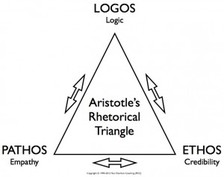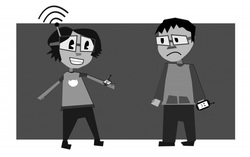Infomercial Fun Student teams did a great job presenting their infomercials this week. The fallacy-o-meter was off the charts with a collective use of 32 total fallacies between the four teams that presented! Teams were judged on creativity, effectiveness, and total number of fallacies used. Team Kate-Denver came out on top, selling us on a stuffed animal pet that no kid can be without. Other teams peddled cell phones, bike helmets and whipped topping - all very effective and also humorous! Learning to identify commonly used fallacies such as hasty generalization, ad hominem, straw man, bandwagon, emotional appeal, etc. is an important skill to acquire. Advertising is an easily identifiable form of persuasion that is rife with the use of fallacies and false claims. Once you become familiar with the specific fallacy types, you'll find that you begin to see them everywhere! It becomes more difficult to identify clever and subtle fallacious arguments in political speeches, newspaper editorials, and discussion/debate. The goal is for students to develop a familiarity with these tactics and to practice fallacy-free persuasion in their own writing. Aristotle's Appeals The Greek philosopher Aristotle divided the means of persuasion into three categories - Ethos, Pathos, Logos. We discussed the importance of incorporating all three appeals into a well-rounded and effective persuasive argument. Ethos - Appeal to Character, means convincing by the character of the author. We tend to believe people whom we respect. One of the central problems of argumentation is to project an impression to the reader that you are someone worth listening to; an authority on the topic, as well as someone who is likable and worthy of respect. This can be done by illustrating your knowledge of the topic - providing expert testimony, statistics, and facts. However, it is equally important to establish common ground with your audience. If you help the reader understand that you share a common end goal or belief ("We can certainly all agree that...."), they will be more likely to listen to your side of the argument and entertain your thesis. Pathos - Appeal to Emotion, means persuading by appealing to the reader's emotions. Emotional appeal can effectively be used to enhance an argument as long as you have presented a logically sound, factually supported argument. Emotional language can really engage the reader and help them to remember and act on the issue in question. One way to effectively and ethically incorporate an emotional appeal is to use vivid images in your argument. Another approach is to provide a personal anecdote or story that will resonate with the reader. But a note of caution - be sure to use emotional appeal legitimately. Emotional appeal should not be used to oversimplify a complex issue. Do not draw on stereotypes or manipulate the reader's emotional fear. Don't use emotional appeal merely for shock value. And never use emotionally charged language or examples simply to upset or anger the reader. Logos - Appeal to Reason, means persuading by the use of logic/reasoning. Aristotle considered this the most important technique and it should form the backbone of your persuasive argument. Using both deductive and inductive reasoning, you provide effective, persuasive reasoning to back up your claims. An appeal to logic is calm, based in facts and direct observation, and is swayed by evidence not passion. Incorporating the appeal to logic shows the reader that your position well though out, not simply based in personal belief or just an overall feeling about a topic. You support logical appeals with facts, statistics, and direct observations from credible sources. Homework I've set out a tall order for homework this week but I know these students are up to the challenge! They are all anxious to move into the debate phase of our class in a few weeks. To do so successfully, students will need to be able to take a topic and fully develop a persuasive argument. This requires researching a topic, analyzing both sides of the issue, developing a clear thesis, and organizing strong lines of argument. For homework this week students will consider this topic: Are wearable computers the next big technological innovation? Do you see yourself walking around with computerized glasses a few years from now, snapping pictures, sending messages or getting directions? Or is the hype and controversy misplaced?
Good Luck! Don't be overwhelmed - you've got this! Comments are closed.
|
Categories
All
Archives
May 2016
|

 RSS Feed
RSS Feed